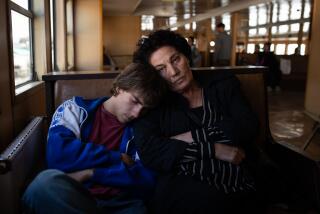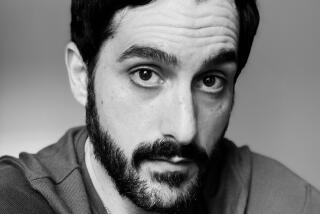Movie review: ‘Anton Chekhov’s The Duel’
- Share via
Calling a film “Anton Chekhov’s The Duel” underscores the Russian writer’s pride of place as the prime mover in this expert literary adaptation. But if it weren’t for the masterful work of director Dover Kosashvili, this rich, evocative film wouldn’t have nearly the impact it does.
Israeli director Kosashvili seems at first glance an unlikely choice to direct screenwriter Mary Bing’s pointed English-language adaptation of Chekhov’s novella about love and lassitude in the Caucasus, the longest work of narrative fiction, in fact, in the great writer’s portfolio.
But Kosashvili’s family has roots in the region, having immigrated to Israel from Georgia, and the director’s first film, 2001’s exceptional “Late Marriage,” shares with this one a feeling for the intricacies of emotional entanglements and an empathy for those in impossible dilemmas of their own making, individuals who would like to be better people but find the task beyond them.
For what’s characteristic of Chekhov in general and this film in particular is that it is a story without heroes or villains, a tale of flawed protagonists by a writer who was fascinated by human frailties and foibles in all their psychological diversity.
Certainly the minor Russian bureaucrat Laevsky (Andrew Scott) is as flawed as they come. He has run off to a seaside town in the Caucasus with Nadya ( Fiona Glascott), another man’s wife, hoping to start a new life as a man of the soil.
But just as “the tropics” classically sapped the will of the Englishmen who moved there, so the endemic listlessness of the Caucasus has overwhelmed Laevsky. An intelligent, sensitive man with less than zero willpower, Laevsky spends all his time drinking and playing cards with layabouts, scoundrels and seducers. He knows he’s a “worthless, foolish, depraved man,” and there’s nothing he can do about it.
Worse, as he tells his only friend, the empathetic doctor Samoylenko (Niall Buggy), after dragging Nadya to a place where people put handkerchiefs on their faces to keep the flies off while they sleep, he has fallen out of love with her. And more dire still, Laevsky, fearing the pressures on him that will result, hasn’t yet told Nadya that the husband she abandoned has died.
For her part, the attractive Nadya, a naturally flirtatious coquette who is bored out of her mind, has taken to leading on a wide variety of local men. The most potentially dangerous is the authoritarian police captain Kirilin (Mislav Cavajda), who tells her, in one of Chekhov’s fine lines, “our love withered away before it had time to flower.”
Observing this with the dispassion of the scientist he is is the zoologist Von Koren ( Tobias Menzies), who though Russian has a tellingly Germanic name. The haughty Von Koren actually does useful work, and lots of it, and he has no patience for his dithering fellow countryman, going so far as to say “when the Laevksys multiply, civilization will perish.”
Though there are romantic rivalries aplenty in this story, the Chekhovian twist to the situation is that the ill-will between Laevsky and Von Koren is not over a woman but over philosophical positions about how life should be lived and where Russia’s future lies, a contretemps that was very much an issue for the intelligentsia of Chekhov’s day.
Mary Bing’s debut feature script sticks close to the novella, and director Kosashvili is always alive to the story’s richness of character and situation. For American audiences at least, that the film’s excellent actors are largely unfamiliar helps the story take hold of us on its own terms.
Also key to “The Duel’s” success is Paul Sarossy’s luminous location footage of its Croatian setting. Shot largely in Istria and the Istrian coast, the film makes the most of its physical beauty and its impeccable re-creation of the 19th century in general and the languor of provincial life in particular.
Though it’s never mentioned, a future Chekhov could not foresee haunts this film. Neither the romantic dreamer nor the scientist would be Russia’s future as the ruthless Soviet man in effect extinguished both types. The Chekhov who wrote, “In search of the truth people make two steps forward and one step back,” would have made the most of that.
More to Read
Only good movies
Get the Indie Focus newsletter, Mark Olsen's weekly guide to the world of cinema.
You may occasionally receive promotional content from the Los Angeles Times.











